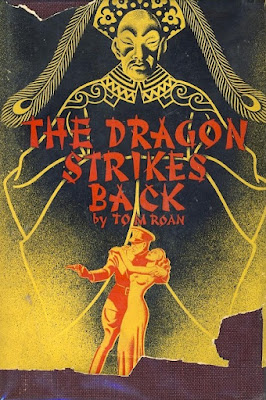Tom Roan, the son of an Alabama sheriff and a lawman himself, is best remembered for the hundreds of stories he wrote for the Western pulps in a career that lasted more than thirty years, from the early Twenties to the mid-Fifties. He wrote a handful of Western novels, too, and died in 1958. While the vast majority of his work falls in the Western genre, he wrote quite a few detective stories and thrillers, as well, including the espionage yarn THE DRAGON STRIKES BACK, published in 1936 by Julian Messner and reprinted by A.L. Burt a couple of years later.
Years ago, I read some pretty negative comments about this novel but thought it
sounded intriguing enough to check out, so I hunted up a copy. However, I never
got around to reading it before it was lost in the Fire of ’08, and I never
replaced it because copies for sale on-line are fairly expensive. Livia knew I
still wanted to read it, though, so she found one and got it for me as a
Christmas present. So finally, more than a dozen years after I originally set
out to, I’ve read THE DRAGON STRIKES BACK.
My copy is lacking a dust jacket, so that cover image above is one I found
on-line. And it’s more than enough to tell you that this is a Yellow Peril
novel, although it doesn’t follow in the footsteps of Sax Rohmer quite as much
as you might think from the cover. The plot is pretty simple: somebody is
trying to provoke a war between the United States and Japan. Ships are sunk.
Japanese diplomats in San Francisco are murdered in some mysterious, grotesque
fashion. An admiral’s beautiful daughter is abducted. The world trembles on the
brink of war.
Tasked with sorting everything out and preventing that war are Secret Service
agents William “Eternity Bill” Mandell, a corpulent, Nero Wolfe-like detective,
and his Archie Goodwin, an Army captain named Andrew Lee who’s on detached duty
from the cavalry. Captain Lee is also in love with the admiral’s kidnapped
daughter. Their investigation puts them afoul of the deadly tongs in Chinatown
and ultimately involves secret passages, chases through the sewers, an
underground temple, a really grisly murder method, and plenty of the pulpish,
over the top, breakneck action that I love. Plus, Roan saves a really nice
twist for near the end, when the true identities of the plotters are revealed.
Now, given the fact that this is a Yellow Peril novel published in 1936,
is THE DRAGON STRIKES BACK politically incorrect to the point of offensiveness?
Well, yes and no. Some modern readers might be put off by some of the dialogue,
but I didn’t find it any worse than a lot of other popular fiction from that
era. I don’t have a problem accepting a work of fiction as a product of its
time. But that’s just me. Is it also clumsily written in places? Yes . . . but
that’s just Tom Roan. He was a storyteller, not a stylist, and was more
concerned with keeping the action galloping along, which he does quite well.
And there are occasional passages that are well-written, especially when
he’s describing the settings, whether it’s fog-bound San Francisco or an
ornately furnished hidden temple or a slimy, sinister sewer tunnel with something
lurking inside it.
So, was it worth it to finally read THE DRAGON STRIKES BACK after all this
time? I’d say it was, definitely. I had a fine time reading this novel and
stayed up late with it a couple of nights, turning the pages to find out what
was going to happen, reluctant to put it down. I think the ending could have
maybe been a little stronger, but I still enjoyed it quite a bit, although it
certainly isn’t a book for everyone.


2 comments:
Nice post! Roan is a fascinating figure. I've written a piece on his 1936 story set in Alabama, "Loot Island" for my Alabama history blog at https://tinyurl.com/2b7r7s9n Bill Plott has done a lot of research on Roan; hope he published something soon!
Thanks for that link! Lots of interesting background on Tom Road to be found there. I know Bill Plott has been researching Roan for a while and I hope he does a book about him. As you say, Roan was quite a colorful character.
Post a Comment